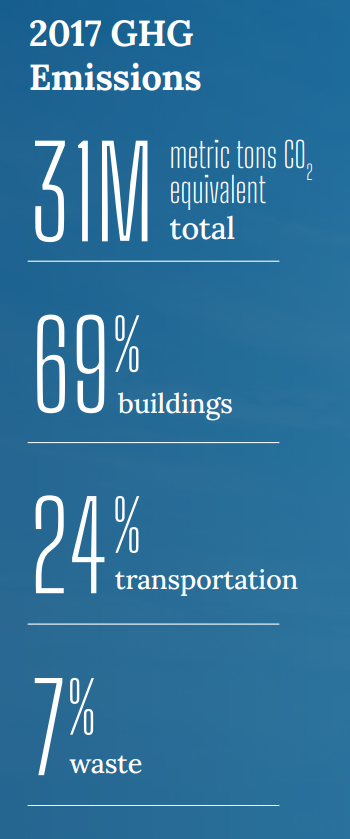Electrify Chicago
An independent tool for viewing City of Chicago building data
According to the
2022 Chicago Climate Action Plan,
69% of Chicago's emissions come from buildings, making
building emissions our biggest challenge and our biggest opportunity as a city
to tackle climate change. At Electrify Chicago, we showcase building performance using
publicly available data supplemented by community-submitted photographs and building
owners.
Start by looking at Chicago's buildings with the highest greenhouse gas intensity i.e. emissions per square foot. Large, efficient, buildings can perform much better than very inefficient small buildings on this metric.
New Article
📰 $30 Million In Missed Fines
The City Of Chicago failed to collect $30 million in potential fines from the building benchmarking ordinance, reducing transparency and accountability.
Legislative update! 🎉
As of late January 2024, legislation is being introduced to require new use more efficient forms of water and space heating, via the Clean And Affordable Buildings Ordinance (CABO), which will reduce the number of highly polluting and inefficient buildings that end up on this site.
If you're in Chicago,
write to your alderman to support the CABO!
Chicago Buildings by Greenhouse Gas Intensity
Note: Data includes large Chicago buildings with data from 2022, unless explicitly stated otherwise.
Note: This data only includes buildings whose emissions are reported
under the
Chicago Energy Benchmarking Ordinance. According to the City “As of 2016,
this list includes all commercial, institutional, and residential buildings larger than
50,000 square feet.” This dataset is also then filtered to only buildings with
reported emissions > 1,000 metric tons CO2 equivalent.
The latest year of data is from 2022, but we update the site regularly when new data is available, and some buildings may have failed to report that year, and only have older data available.
| Property Name / address | Primary Property Type |
Greenhouse Gas Intensity (kg CO2 eq./sqft) |
Total Greenhouse Emissions (metric tons CO2 eq.) |
|---|---|---|---|
|
440 442 W BARRY AVE
440 442 W BARRY AVE
| Multifamily Housing | 4.2 kg/sqft
Lowest 12%
| 284 tons
Lowest 7%
|
|
Southeast Area Elementary School
🕰️
3930 E 105th Street
| K-12 School | 4.2 kg/sqft | 464 tons |
|
Cityview Lofts
1259 N Wood Street
| Multifamily Housing | 4.2 kg/sqft
Lowest 12%
| 211 tons
Lowest 3%
|
|
The Lincoln Common
2335 N Lincoln Ave
| Multifamily Housing | 4.2 kg/sqft
Lowest 12%
| 1,199 tons
Highest 39%
|
|
625 W Adams St
625 W Adams St
| Office | 4.2 kg/sqft
Lowest 12%
| 2,049 tons
Highest 22%
|
|
Glen Lake 1 Condo Assoc.
6400 W Berteau
| Multifamily Housing | 4.2 kg/sqft
Lowest 12%
| 1,826 tons
Highest 25%
|
|
St. Paul Lofts Condominium Association
2333 W Saint Paul Ave
| Multifamily Housing | 4.2 kg/sqft
Lowest 12%
| 444 tons
Lowest 21%
|
|
Amhurst Lofts
2600 N Southport Ave
| Multifamily Housing | 4.2 kg/sqft
Lowest 12%
| 464 tons
Lowest 23%
|
|
-
🏆
301 N Austin Blvd
| Multifamily Housing | 4.2 kg/sqft
Lowest 12%
| 214 tons
Lowest 3%
|
|
Marshall Middle -CPS
(CPS)
3900 N Lawndale Ave
| K-12 School | 4.2 kg/sqft
Lowest 12%
| 765 tons
Lowest 44%
|
|
Sutherland Elementary, Elizabeth H -CPS
(CPS)
10015 S Leavitt St
| K-12 School | 4.2 kg/sqft
Lowest 12%
| 334 tons
Lowest 11%
|
|
Kilmer Elementary -CPS
(CPS)
6700 N Greenview Ave
| K-12 School | 4.2 kg/sqft
Lowest 12%
| 447 tons
Lowest 21%
|
|
Fuller -CPS
🕰️
(CPS)
4214 S St Lawrence Ave
| K-12 School | 4.2 kg/sqft | 389 tons |
|
The Residences at Hudson & Huron Condominium Association
451 W HURON ST
| Multifamily Housing | 4.2 kg/sqft
Lowest 12%
| 926 tons
Highest 48%
|
|
Maple Tower Condominiums
1035 N DEARBORN ST
| Multifamily Housing | 4.2 kg/sqft
Lowest 12%
| 629 tons
Lowest 35%
|
Data Source:
Chicago Energy Benchmarking Data
